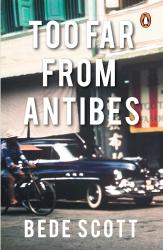Set in 1951, Indochina, TOO FAR FROM ANTIBES is the story of Jean-Luc Guéry and his quest to find the truth behind his brother Oliver's murder. An avid reader of detective fiction, Guéry has a very firm picture of how investigations should proceed, although the likelihood of him being able to achieve that discipline is remote. An incorrigible alcoholic and compulsive gambler he's already squandered a small fortune in the casinos of the Côte d’Azur. And there's nothing at all in the demeanour, attitude or aptitude of this failed fiction writer, come obscure provincial newspaper journalist that bodes well for a successful investigation, or any investigation for that matter.
With touches of the current day fascination for meta-fiction, TOO FAR FROM ANTIBES pursues the idea that Guéry is invested in the truth behind his brother's story, despite whatever dangers he personally faces, because it has become part of the 'novel" that he's writing. This device is elegantly presented to the reader, with tension and menace aplenty, but with an author's touch that never allows the reader to forget that the whole thing is Scott's invention, his to play with, and ultimately resolve to his liking.
The style of TOO FAR FROM ANTIBES employs an archness of tone that carefully straddles the grey area between engagement and irritation, ably assisted by the character of Guéry being so wonderfully, dissolute, almost to the point of celebration of his failings, as opposed to any small achievements. Of course, it does help that he's forced, in the state he's in, to negotiate elaborate conspiracies, organised and ruthless crime figures, and clandestine intelligence operations. All of which could lead a reader to think that the story of Oliver's death is going to be an elaborate tale. What evolves, is far stranger, brilliantly devised and delivered.
Hugely engrossing, frequently funny, fast paced and extremely engaging, TOO FAR FROM ANTIBES was most definitely a standout read in 2023.
Too Far from Antibes

It is 1951, and Jean-Luc Guéry has arrived in Indochina to investigate the murder of his brother, Olivier, whose body was found floating in a tributary of the Saigon River. As an avid reader of detective fiction, Guéry is well aware of how such investigations should proceed, but it is not immediately clear that he is capable of putting this knowledge into practice. In addition to being a reporter for an obscure provincial newspaper, he is also a failed writer, an incorrigible alcoholic, and a compulsive gambler who has already squandered a fortune in the casinos of the Côte d'Azur. Despite his dissolute tendencies, however, and his aversion to physical danger, Guéry does eventually manage to solve the case. In order to do so, he is obliged to enter a world of elaborate conspiracies, clandestine intelligence operations, and organized crime - only to discover, in the novel's final pages, that the truth behind his brother's murder is far stranger than he could have imagined.
Add comment